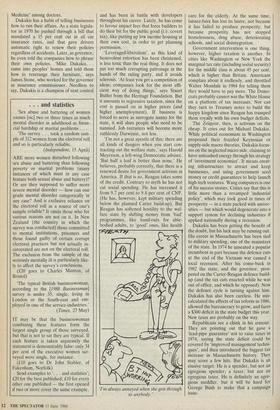. . . and statistics
'Sex abuse and battering of women causes [sic] two or three times as much mental disorder in adulthood as finan- cial hardship or marital problems . . .
'The survey . . . took a random sam- ple of 312 women from the electoral roll and so is particularly reliable.
(Independent, 15 April) ARE more women disturbed following sex abuse and battering than following poverty or marital problems (many instances of which must in any case feature both sexual abuse and battery)? Or are they supposed to suffer more severe mental disorder — how can one grade mental disorder categorically in any case? And is exclusive reliance on the electoral roll as a source of one's sample relaible? It omits those who for various reasons are not on it. In New Zealand (the country in which the survey was conducted) those committed to mental institutions, prisoners and those found guilty of certain corrupt electoral practices but not actually in- carcerated are not on the electoral roll. The exclusion from the sample of the seriously mentally ill is particularly like- ly to affect the survey's conclusions. (no goes to Charles Manton, of Bristol) 'The typical British businesswoman, according to the [1988 Businessman] survey is under 35, single, living in London or the South-east and em- ployed in one of the service-industries.'
(Times, 27 May) IT may be that the businesswoman combining these features form the largest single group of those surveyed, but that is not to sat they are typical. If each feature is taken separately the statement is demonstrably false: only 34 per cent of the executive women sur- veyed were single, for instance.
(£10 goes to Dr John Stabler, of Fakenharn, Norfolk) Send examples to '. . . and statistics'; £20 for the best published; £10 for every other one published — the first opened if two or more cover the same example.


































































 Previous page
Previous page